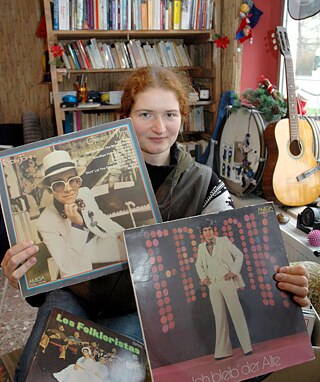“For free” and “shop” – is that a contradiction in terms? Not in Germany’s 25 or so for-free shops: they offer second-hand shopping at zero cost. The reality is colourful, democratic and highly sustainable.
Such an individual is conspicuous here in the suburbs of the sedate Hanseatic city of Greifswald: her outfit is multicoloured, somewhere between punk and vintage, a little reminiscent of Vivienne Westwood. At her feet there’s a shopping bag stuffed with yet more colourful gear. She wears the happy smile of a successful bargain hunter. But the contents of her tote are even more than a bargain – they were a gift. Acquired at zero cost from Greifswald’s Umsonstladen (for-free shop).
From A for Anorak to Z for Zester
In Germany there are around 25 of these shops, which are second-hand stores with a twist. You see, they don’t sell stuff here, instead everything’s available to take free of charge. From A for anorak to Z for zester, there’s almost nothing a for-free shop doesn’t stock: clothes, shoes, books, kids’ games, glasses and crockery, even Christmas decorations and small ornaments. One person’s trash is another person’s treasure.
This simple concept helps the poor, of whom there is an increasing number in our society. But it’s also a good opportunity to integrate sustainability into our everyday lives. More and more people want to recycle, swap and share systematically as a strategy to consume less. What’s the point of producing absolute mountains of clothing under inhumane conditions when we actually have everything we need already? Why do they incinerate worn clothing at landfill sites instead of reusing it?
For-Free Economy Enjoys Higher Demand Than Ever

In 2004, the same year the Greifswald for-free shop first opened, Katrin Wanke found a few LPs released on the AMIGA label from the GDR – including one featuring tracks by Elton John.
The rails in Greifswald’s for-free shop are crammed full of clothes. At a time when we have to consider our resources daily, the concept of the for-free economy is more relevant than ever. “We’re currently so popular that we’re often only able to let a certain number of people in the shop at a time, so that there’s enough space for everyone,” reports managing director Victoria Oertel, who previously worked in for-free shops in Berlin. The information signs in the shop are multilingual: German, English, Cyrillic. And there’s a reason: the war against Ukraine has brought many refugees to Greifswald as well.
Activities in the shop are supervised by a team of around 12 volunteers, because the Greifswald for-free shop is run entirely on a nonprofit basis. Oertel herself otherwise works as a research fellow at Greifswald University’s Faculty of Philosophy. The shop assistants offer advice, overcome language barriers, keep everything tidy and ensure people are treated respectfully.
Everyone’s Equal in the For-Free Shop
Anyone who wishes may enter the shop: unlike organisations such as Die Tafel or the Deutsches Rotes Kreuzclothing store, no means testing is required here. “There’s a difference in form, but also in emotional terms: our visitors present as users rather than as people in need. It’s empowering for them and supports self-reliance, as well as facilitating inclusion.”
Social conditions are a secondary concern in for-free shops. Workers and the unemployed, children and pensioners, university students and schoolkids – all browse the shelves alongside each other. “We could do with more electronics, and saucepans,” say the co-workers of the product selection. “Whenever we get pots and pans in, they go straightaway.” The thing is, there’s no upper limit on what people can take. A friendly notice on the shop’s website simply requests a “sense of proportion”. And also donations, because rent and utility bills for the shop don’t come for free: all outgoings are solely funded by voluntary contributions.
 One person’s trash is another person’s treasure: the children’s corner in the Greifswald for-free shop.
One person’s trash is another person’s treasure: the children’s corner in the Greifswald for-free shop.
The Worldwide Sharing Movement
The concept of the for-free shop also exists in digital format, for instance the gifting network freecycle.org. It has almost 11 million members worldwide, whose mission is “to build a worldwide sharing movement that reduces waste and saves precious resources”. After registering for free, users can allocate themselves to a town and advertise their free goods to a local target market, or do their own “shopping”. The Buy Nothing project app in the USA works in a similar way.
The principle: one person’s trash is another person’s treasure. It does actually happen that someone unknowingly hands in an item of value and someone else equally unknowingly acquires it, as Oertel knows from experience. Of course she’s thrilled when things change hands like this. “But what really impresses me is when people donate their musical instruments. That’s a very personal gift.” And her colleague adds: “Every item here in this shop tells its own story.”
Related Links
July 2023
